News
‘Lagos Lawmakers List Obasa’s Sins Which Led To His Impeachment’
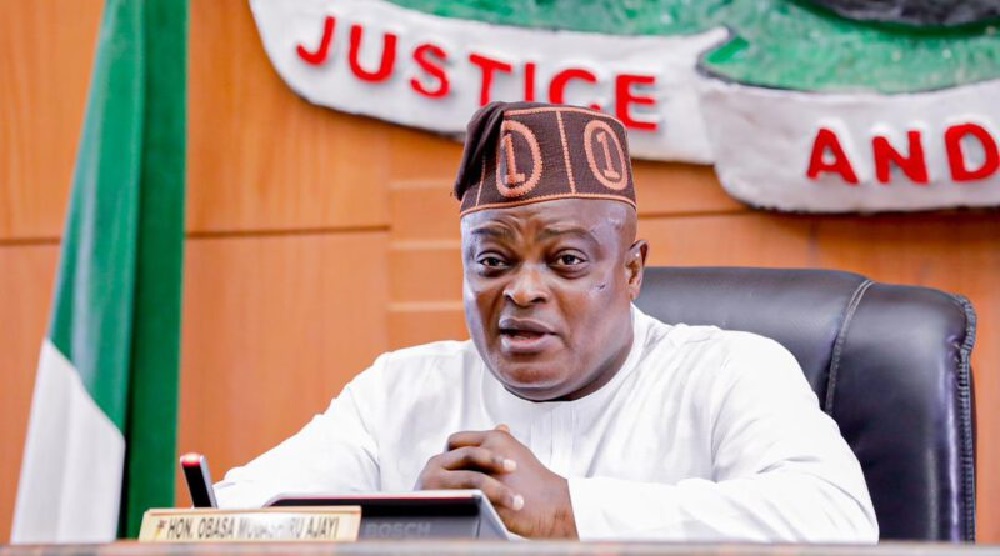
The Lagos State House of Assembly has explained its decision to impeach former Speaker Mudashiru Obasa on Monday, citing persistent lateness, authoritarian leadership, and incitement of divisions among members.
Obasa, who represented the Agege constituency, was replaced by his deputy, Mojisola Lasbat Meranda of Apapa I, making her the first female Speaker in the Assembly’s history.
In a sweeping leadership overhaul, the lawmakers also removed the Clerk, Olalekan Onafeko, reportedly appointed by Obasa during his tenure.
Grounds for Impeachment
The motion to impeach Obasa, moved by Femi Saheed under Matters of Urgent Public Importance, accused the former Speaker of gross misconduct. Invoking Section 92(2)(C) of the Nigerian Constitution, Saheed outlined several charges, including:
Persistent lateness to legislative sessions.
Highhandedness and disregard for fellow lawmakers.
Abuse of office and privileges.
Intimidation of members and promotion of internal divisions.
Undemocratic and authoritarian practices.
Saheed described the impeachment as a necessary step to restore order, democracy, and integrity within the Assembly. The motion was unanimously supported by 32 members through a voice vote, officially ending Obasa’s decade-long tenure as Speaker.
Leadership Restructuring
Following the impeachment:
Mojisola Meranda was elected as the new Speaker.
Fatai Mojeed emerged as the Deputy Speaker.
Abubakar Ottun was appointed Acting Clerk after the suspension of Olalekan Onafeko.
Enhanced Security Measures
In the aftermath, the Assembly complex was secured by armed personnel from the Rapid Response Squad (RRS), Lagos Task Force, and the state police. Visitors and motorists were turned away, while some individuals, reportedly supporters of Obasa, were arrested for attempting to breach security. Charms and amulets allegedly linked to these supporters were recovered.
Financial Mismanagement Allegations
Obasa’s administration faced growing scrutiny over allegations of financial impropriety, particularly involving budget allocations and expenditures:
Vehicle Allocations: Despite ₦30.19 billion allocated in 2023 and ₦13.33 billion in 2024 for official vehicles, no vehicles were reportedly purchased in 2023, and only a fraction of the 2024 funds has been accounted for.
Capital Projects: Critics questioned ₦15.65 billion allocated for office construction in 2023 and 2024, deeming the expenditure excessive given the functionality of existing facilities.
Property Investments: ₦1.1 billion allocated for properties in 2023 and ₦126 million in 2024 for properties in Abuja raised concerns about misplaced priorities.
These alleged irregularities have fueled public outrage, with citizens and advocacy groups demanding greater accountability.
Abiodun Tobun, representing Epe Constituency 1, stated that the decision to impeach Obasa was a collective effort to safeguard the Assembly’s image and promote inclusivity. “Change is inevitable, and we believe this step is necessary for the progress of Lagos State,” Tobun explained.
Civil society groups have also raised questions about Obasa’s stewardship, particularly the reported ₦17 billion spent on fixing the Assembly gate. Obasa dismissed the claim as “spurious and absurd,” adding that such allegations are politically motivated ahead of the 2027 elections.
Advocacy groups and concerned residents have urged the Assembly to provide a detailed breakdown of expenditures over the past two years. They argue that without transparency, governance risks becoming a tool for personal enrichment at the expense of public welfare.
The impeachment of Mudashiru Obasa underscores the growing demand for accountability and transparency within Nigeria’s political institutions. With new leadership under Speaker Mojisola Meranda, the Lagos State House of Assembly aims to restore public confidence and focus on delivering its legislative responsibilities effectively.
News
NLC Warns Abure to Step Aside, Urges LP Members to Be on Standby

By Gloria Ikibah
The Nigeria Labour Congress (NLC) has issued a stern warning to Julius Abure, following the Supreme Court ruling on April 4, 2025, which declared the tenure of Mr. Abure and his National Working Committee (NWC) as expired and no longer legally recognized.
Despite the court’s clear ruling, Mr. Abure has continued to release statements insisting he remains the chairman of the Labour Party (LP). The NLC has strongly condemned his actions, describing them as “an affront” to the rule of law and the authority of Nigeria’s highest court.
In a statement signed by the NLC President, Comrade Joe Ajaero, the Congress accused Abure and his supporters of “crass disdain for decency” and warned that the patience of Nigerian workers and genuine LP members is wearing thin.
“The current affront of Mr. Julius Abure and co-travellers against the law… has convinced those who doubted our earlier position that Mr. Julius Abure and the few miscreants following him have sworn themselves to utter impunity,” the statement read.
The NLC also debunked allegations that it was planning to attack Labour Party offices, calling such claims false and a distraction from the real issue of compliance with the Supreme Court judgment.
“We use this medium to put every Nigerian worker, Labour Party member, and patriotic citizen on alert. We will no longer condone the antics of inconsequential characters like Mr. Julius Abure,” Ajaero said.
He added that the NLC and its allies would not stand by while the rule of law is undermined and urged all genuine members of the Labour Party to prepare to “peacefully repossess all offices of Labour Party nationwide.”
According to the statement, the NLC Political Commission and concerned stakeholders will soon issue directives on how this will be carried out. They also called on security agencies, especially the Nigeria Police and the DSS, to uphold their constitutional responsibilities and support the enforcement of the Supreme Court’s judgment.
The statement also urged the Independent National Electoral Commission (INEC) to fully comply with the court’s ruling by removing all traces of Mr. Abure and his team from its records.
To resolve the current leadership crisis in the Labour Party, the NLC said the remaining institutional members of the party’s National Executive Committee (NEC) are expected to appoint an interim leadership and organize a Special National Convention, as prescribed by the party’s constitution.
“A word is enough for the wise!” Ajaero added.
News
Reps Begin Probe Into Alleged Misuse of Agricultural Funds
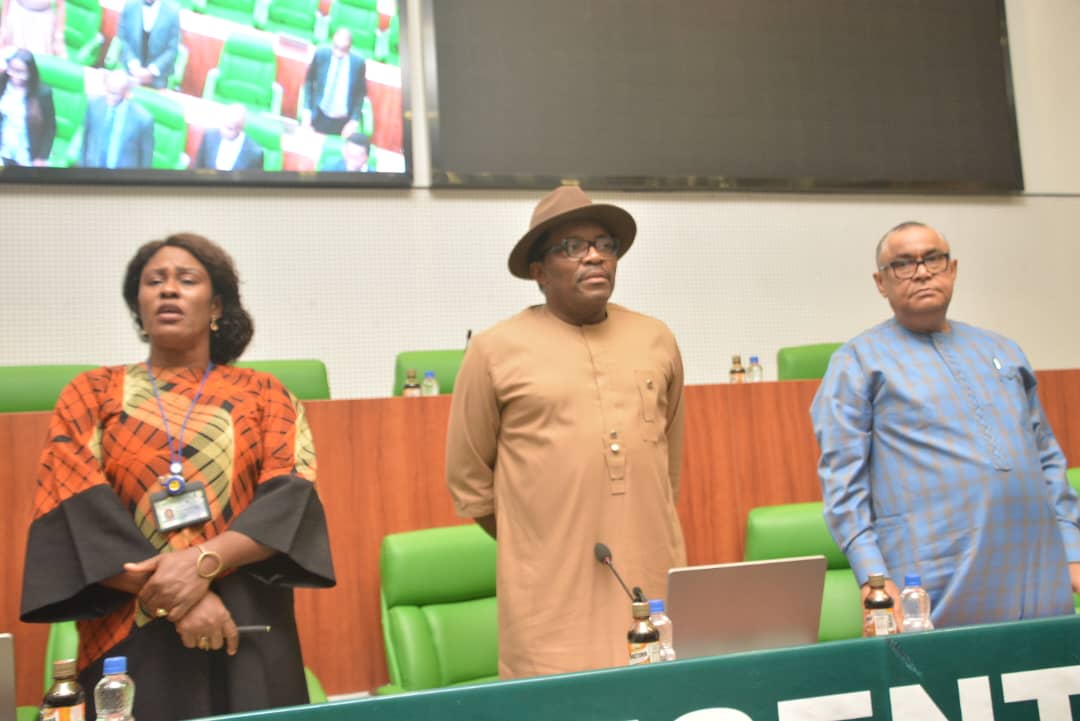
By Gloria Ikibah
The House of Representatives has commenced investigations on the alleged mismanagement of funds meant for agricultural development by government agencies outside the Federal Ministry of Agriculture.
Declaring open the inestigation, Chairman Committee on Nutrition and Food Security, Rep.Chike Okafor, said the hearing was to uncover the truth and ensure accountability in the use of public funds.
Rep. Okafor noted that despite trillions of naira reportedly spent on agriculture over the years, Nigeria still battles food shortages, hunger, and high food prices.
“This hearing is not a witch-hunt. Our purpose is not to target individuals or institutions but to uncover the truth, identify systemic failures, and ensure that public funds allocated for agricultural development are utilized transparently and effectively.
“If these funds had been judiciously spent, we would not be facing the current crisis where millions of Nigerians struggle to afford basic meals,” he said.
The probe, according to the Chairman, follows a motion passed by the House titled “Alleged Mismanagement of Government Agricultural Initiatives and Funding by Departments, Agencies, and Government Programs Outside the Federal Ministry of Agriculture and Food Security”.
He listed key institutions under scrutiny, including the Central Bank of Nigeria (CBN), Nigeria Incentive-Based Risk Sharing for Agricultural Lending (NIRSAL), Bank of Industry (BOI), Bank of Agriculture (BOA), and the National Agricultural Development Fund, among others.
Some of the figures raised by the committee include:
– ₦1.12 trillion disbursed to over 4.6 million farmers through CBN’s Anchor Borrowers Programme (ABP),
– ₦215 billion disbursed by NIRSAL to support agriculture and agribusinesses,
– ₦3 billion given to 22,120 smallholder farmers by BOI,
– ₦59.4 billion in loans for agro and food processing businesses,
– ₦5 billion livestock loan facility to BOA in 2023,
– ₦1.6 billion recovery fund released in 2024 by the National Agricultural Development Fund to fight ginger blight disease.
Rep. Okafor explained that the Committee is empowered by the House rules to investigate how these funds were allocated and used, and determine if they truly made an impact.
He demanded foe detailed information from the agencies covering the period between 2017 and 2024, including lists of beneficiaries, addresses, project locations, loan terms, recovery plans, and collaboration with donor partners.
“The Nigerian people deserve to know how their resources are being used, and this Committee is committed to ensuring that every kobo allocated to agriculture serves its intended purpose,” he said.
He also acknowledged that the Bank of Agriculture recently appointed a new Managing Director and confirmed that a letter to that effect has been received by the Committee.
The Chairman therefore urged all agency representatives to be open and sincere in their presentations, and charged the media and civil society to play their part in holding government accountable.
“The goal is not to antagonize but to collaborate in finding solutions. Where there are gaps, let us address them. Where there are inefficiencies, let us correct them. And where there are infractions, let us take necessary actions to prevent recurrence.
“With that, I declare this investigative public hearing open. I look forward to a robust, insightful, and solution-driven deliberation,” he stated.
Governor of Central Bank of Nigeria CBN, Olayemi Cardoso, represented by Mr Kwasari John Harman, an acting director in CBN said the Apex bank disbursed N1.21 trillions and N871 billion among others
He said that all commercial banks in the country received funds from the federal government on the Anchor Borrowers Scheme of the previous administration.
News
Tinubu: Pascal Dozie’s contributions to Nigeria’s economic architecture left an enduring legacy
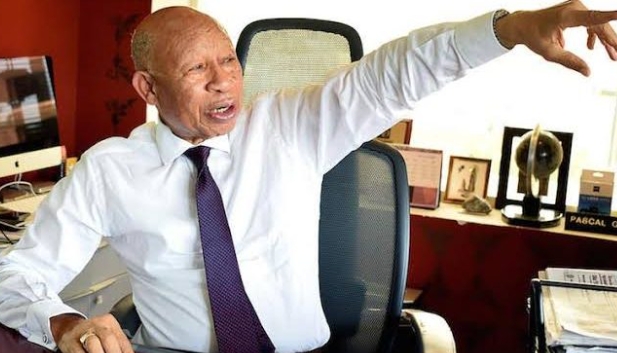
By Kayode Sanni-Arewa
President Bola Ahmed Tinubu extends his heartfelt condolences to the Dozie family, the business community, and all Nigerians on the passing of Chief (Dr.) Pascal Gabriel Dozie, an elder statesman, entrepreneur, and banker. He was 85.
Chief Pascal Dozie, OON, was a visionary whose contributions to Nigeria’s economic architecture left an enduring legacy.
As the founder of Diamond Bank and the pioneer Chairman of MTN Nigeria, he was at the forefront of two of the most transformative sectors in Nigeria’s development journey: banking and telecommunications.
Chief Dozie, a steadfast believer in Nigeria’s vast potential, was pivotal in shaping the financial services industry and expanding access to mobile connectivity nationwide. His influential leadership extended well beyond corporate boardrooms.
In addition to his business acumen, Chief Dozie served as a former director at the Central Bank of Nigeria, President of the Nigerian Stock Exchange, and Chairman of the Nigerian Economic Summit Group, dedicating decades of service to national policy formulation, private sector development, and youth empowerment.
President Tinubu lauds Chief Dozie as “a rare breed business leader whose wisdom, humility, and pioneering efforts laid a foundation upon which many continue to build. His passing is a profound loss to the private sector and Nigeria.”
The President prays for the peaceful repose of Chief Dozie’s soul and extends his condolences to his wife, children, and extended family. He calls upon the Nigerian private sector to honour Chief Dozie’s memory by upholding the values of integrity, innovation, and nation-building, for which he was renowned.
*Bayo Onanuga
Special Adviser to the President
(Information & Strategy)
-

 News10 hours ago
News10 hours agoJust in: Founder of Diamond Bank and ex-chairman of MTN, Paschal Dozie is dead
-

 News17 hours ago
News17 hours agoRainfall washes away newly constructed multi-million naira road in Edo State
-
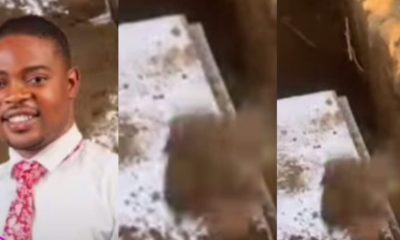
 News16 hours ago
News16 hours agoEvangelist Kekere Jesu buried amidst deep sorrow
-
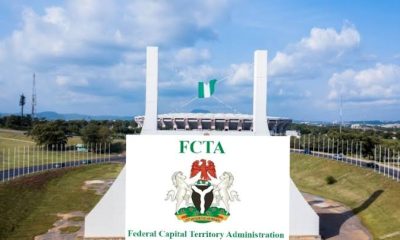
 Metro17 hours ago
Metro17 hours agoStray bullet from VIP convoy kills bystander in Abuja
-

 News11 hours ago
News11 hours agoNaira Nosedives Against Dollar
-

 Sports10 hours ago
Sports10 hours agoReal Madrid keeping tabs on Victor Osimhen
-

 News11 hours ago
News11 hours ago2Baba’s Lover Natasha Osawaru Fired As Edo Assembly Minority Leader
-

 News5 hours ago
News5 hours agoTRADE WAR! U.S. angry over Nigeria’s import ban on 25 products

















